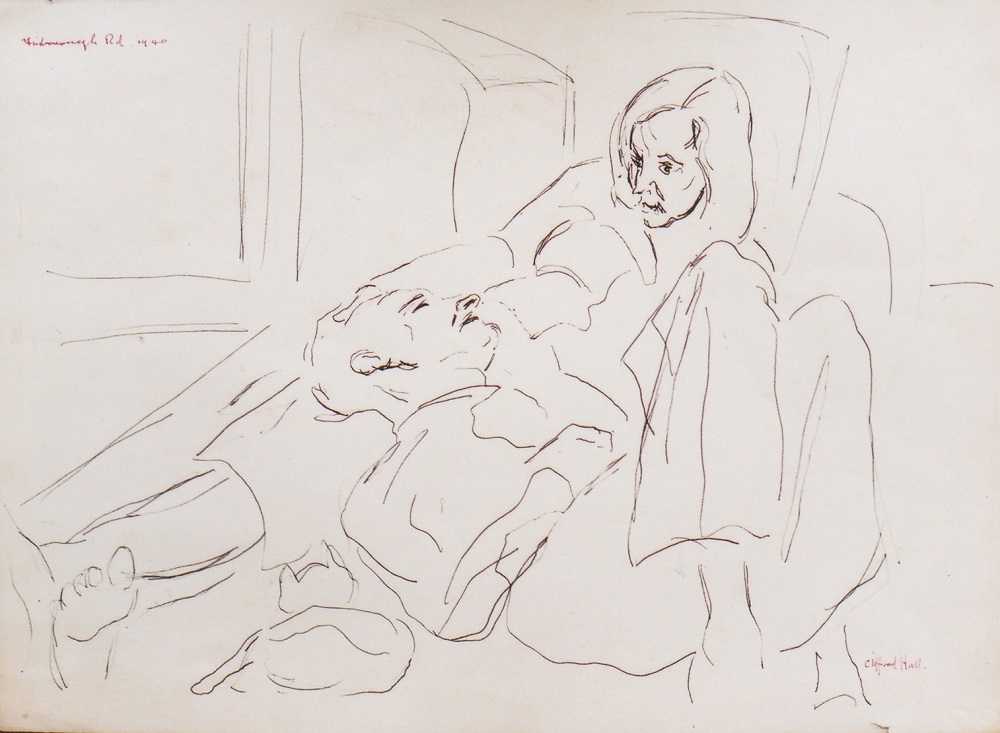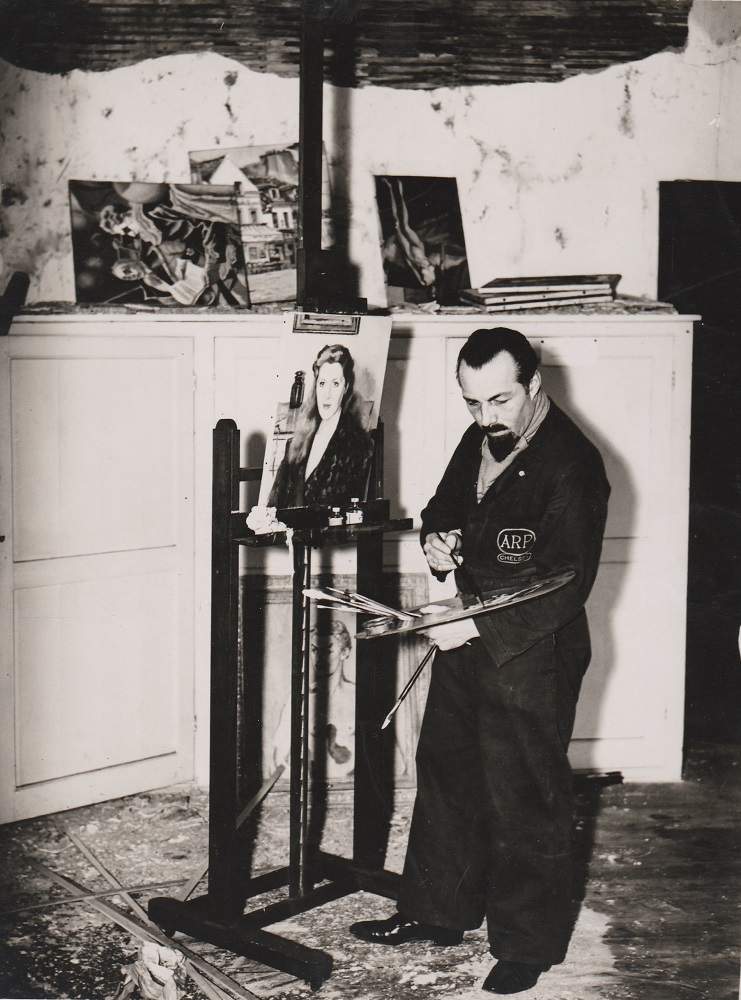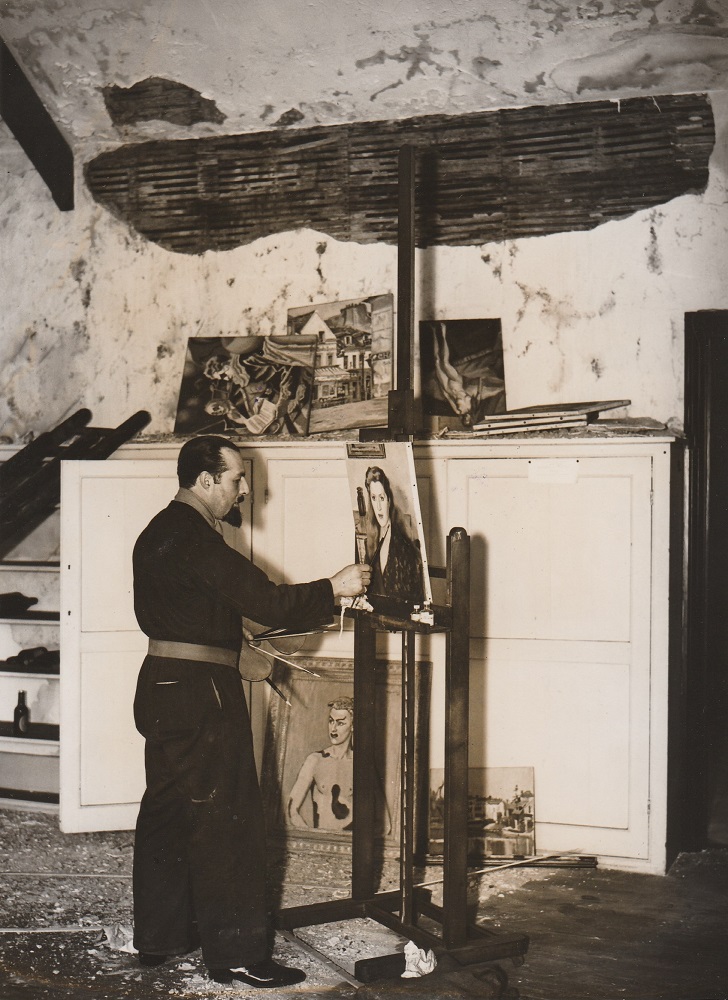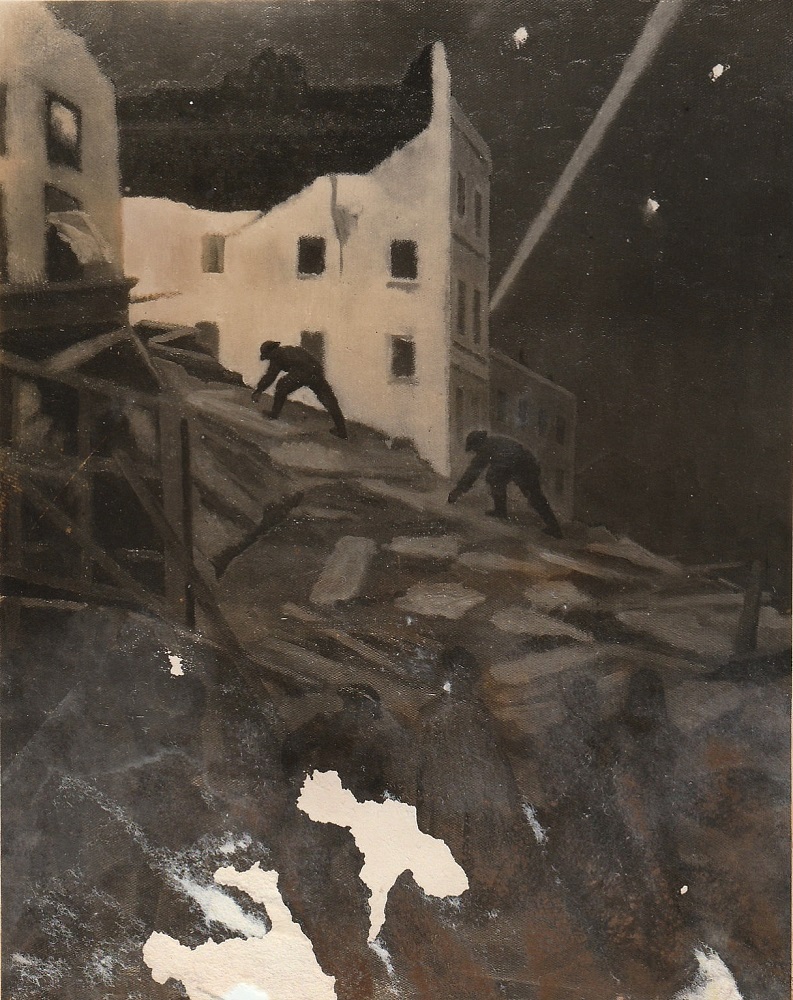




Letter to Marion
1 November, 1940
Dearest,
Your two letters written last Sunday and Monday were waiting for me at the studio yesterday. I will, I hope, be coming to see on the 21st November. That is how things stand at present but it depends on fitting in with other men's leave. No chance of Christmas, I fear. I am on duty Christmas Day, however, for the moment I am concentrating on the 21st November.
I am hoping it will be then as it is only another three weeks to wait but in any case I will be coming round about then and will let you know for certain as soon as I can.
I have just found out the fact has been carefully concealed from us officially, or just forgotten, that I may be entitled to an allowance of eight shillings a week for you and Julian now that you are living outside of London. I am writing about it this morning and, if I am lucky, I expect I will be sending a form for you to fill in. I am determined to get all I can out of this job, for I am beginning to feel I would be very underpaid at even ten pounds a week! Anyway, we will see what happens.
I painted the oil I sent you a sketch of in my last letter. Did it yesterday; in spite of the raids, in fact they provided the right atmosphere. I left out the searchlight though. It seemed to spoil it, and then I remembered there were very few searchlights that night - the moon was full so they were not much use. I must have been mixing it up with some other night.
I will certainly try to bring some drawings with me for you to see. You must not mind if I am sleepy. I am so very tired. I have not had a decent night's sleep for nearly three months and it is beginning to tell a bit. Of course, it is a common enough complaint in London nowadays. Nearly everyone I see looks like they needed a good rest. My trouble is that when I am here every other night, I never get more than three or four hours and broken at that. Some nights none at all. However, I suppose we are winning and that is the main thing. And here's a gem from last night's "Star". The Best of London is speaking, he says: "I doubt whether ever before Government and local authorities and all citizens have been so closely united in a sense of common responsibility, or so ready to see a thing through together."
SEZ YOU! One asks, is he a fool or a knave?
The answer is a knave in the pay of the Government.
Of course, cooperation is gradually growing but one only has to consider the attitude of thousands of householders towards homeless people, the Government's policy regarding shelters and many other glaring wrongs to see that it is a war in which the only real suffers are the masses. So why kid myself? I still feel more than able to deal with the whole thing.
There is a nice coke fire in this hut and although three of us have to take it in turns to be here 24 hours and two must always be here together, one might be in worse places. Some humourist has brought along an old sword with a long, curved blade engraved in Latin, "For God and Country." What stupid things men have done for these two reasons, although in most cases it would be truer to say for Money and Power. Only the ones who can't or won't think fall for the first slogan. This gate guard only comes 'round for us, once every two weeks.
Your letters made me happy. I know you will always help me and I will make you happy. I cannot be other than myself; but I have a great love for you and admiration too, for in your way you are doing something that matters, and you are being very brave about it. I know how bored and lonely you must be, and often, and I would sooner face present conditions here than boredom. I am sure that having the baby makes up for a lot, but not for everything. That would be impossible; but never doubt that we will be together again. It is absolutely certain and there is still lots and lots of time.
I expect he looks sweet in his white fur coat. I am looking forward to seeing him in it. I hope he behaved better than Richard at the tea party. You did not say. Is Fred still running his car? If he is, I shall have to make use of him when I get to Dorchester. I have not yet decided whether to come by rail or coach. There is a big difference in the time, if the trains are not all over the shop like they were when you left.
Last night was one of the quietest we have had, but the weather conditions have been very bad for the last week or so. In spite of the damage and disorganization there is little doubt that we are winning the battle of London and the Germans look like having their work cut out in the near East very soon which doubtless will help to ease things here. I have a feeling that London has now seen the worst of the bombing but believe me it has been bad enough. Still is really, although there has been a discernible improvement. Bet you half a crown the war's over next year. It's the mess they will make of the peace that I still find disturbing.
All my love to you both but an extra special bit extra for you,
Clifford
PS
I have just read a very good book. "Chaos is Come Again" by Claude Houghton. Try to order it in Dorchester. Penguin, 6D.
Journal Entries
November 2, 1940
Gate guard duty last night. Four planes in the sky soon after dark. Bombs followed them. Shawfield Street hit and in a horrible state. Anderson shelters in the back gardens just flung about, turned upside down. A nasty night which eased off about 4.30am.
Afternoon.
Selected the watercolours and drawings for Ala Story. Here is the list:
1. Afternoon, Place du Tertre (W)
2. Rue Radeau, Marseille (W)
3. Woman Sewing (W)
4. Rue des Fenots, Marseille (D)
5. Pier Hotel, Chelsea (D)
6. Three Clowns, Mills Circus (D)
Decided that Seaton Street is worth working out using the oil I did the other day as a guide. Ordered a 30"x25" canvas.
Arts Theatre, 4.45. Leo still talks of doing our ballet.
Arrived at Putney about 7 o'clock. A very dark night. Wonderful being all by myself on top of the bus, sitting in complete darkness. Outside, through the windows, hardly anything to be seen. Heavy rain. Gun flashes far away, well on the outskirts of London. Did not know where we were until I caught a glimpse of the river as we crossed Putney Bridge. A weirdly exciting ride and a magnificent driver.
November 3, 1940
Called out twice. First to Blantyre Street. The ceiling had fallen injuring a woman's back as she bent over the gas cooker. Took her to St Luke's Hospital in the car.
Back to the Depot for tea where I got talking to one of the Rescue men who had worked on the Shawfield Street 'incident'. He told me almost incredible things about the mortuary. He had taken five bodies there from Shawfield Street. Said the smell of the place was appalling. The attendant told him that one body had already been there two weeks and five days. Waiting to be identified, I suppose. But why not cold storage or some method of arresting decay? Imagine having to visit the place to identify anyone belonging to you! They were lying on the floor. I can scarcely believe this, although he did not seem the sort of man to lie, and I put it down for what it is worth.
Later: sent out to Shawfield street where they were still trying to dig out another victim.
The crater is huge, and measures, I was told, one hundred feet across and forty feet deep. The damage very extensive. Five houses completely blown to pieces and dozens badly knocked about by the blast.
Utter desolation in a misty dying light, hazy with rain, yet not lacking in fascination or beauty.
It is now 8.20 p.m., pouring hard and black as pitch outside. A raid was going on whilst we were out. The 'All clear' went an hour ago. They are singing and dancing with the ambulance girls in the recreation room and Charlie Brown is playing.
I have made a memory sketch of Shawfield street.
Ernie told me an amusing story at supper time. He spends his off nights in a public shelter in Fulham. The other night, as he put it, a bloke was having a bit with his missus, lying in a corner. One of the shelterers, a woman, complained to the warden, saying he should make them behave decently. 'It's no good,' replied the warden, 'you can't interfere with nature. War or no war. If you'd turn the other way or shut your eyes you wouldn't see them.' A very sensible man.
Howard brought a whole chicken and a lot of celery and insisted I shared it with him for lunch. We put up a card table in the duty room and borrowed plates, knives and forks from the canteen. Almost civilized. I have enjoyed myself today.
November 4, 1940
Commenced a 30" x 25" of Seaton Street. Bryce came, by chance, just at the right moment. Dressed him up in my overalls and helmet and did three sketches. Then in my old trench coat and finally in a woman's blue dressing gown he had with him. Why? And with a shawl over his head; from the back, he made an excellent girl. Just what I wanted. Feel the picture should be a success. Worked at it in charcoal till three, then I felt so tired I lay down. Could not sleep.
Shrapnel falling in the street as I waited for a 14 bus at Fulham. Sirens.
Last night, Sunday, no raid. Slept abominably. The first raid free night for 57 nights.
Letter to Marion
4 November, 1940
Just got your letter last Monday.
As things now stand I should arrive on the 22nd November, a Friday, and will not have to leave until Tuesday morning - three whole days with you.
Writing later. Love,
Clifford
Journal Entry
November 6, 1940
Went on with my picture - coloured turpentine stage.
Next: prepare the sky warm; white, Indian red, raw umber, French blue. This mixture in varying proportions can be used for the whole of the underpainting. No viridian or yellow ochre to be used in this stage. The general tone of the underpainting will thus be purple. Red purple, blue purple, umber purple. And it must be very low in key so that the process of continuing the picture will be one of gradually bringing it up to the required pitch, rather than taking it down; which is the procedure with the usual high-keyed underpainting. I am sure the former method will be the most suitable for the effect I have in mind.
Some painters rather sneer at effects, but I cannot entirely ignore them although an effect and nothing deeper is obviously not enough.
I must be careful not to bother about detail, for this is night: moonlight, and, as I remember it, only the very light house stood out sharply defined against the sky. The figures were dark silhouettes, their edges diffused but the mass of each figure solid; somehow to be achieved without any sharp contrasts of light and shade. The polished rims on the helmets of the near figures did catch the light; but not brightly.
And remember; the preparation must not be loaded, otherwise having it so dark would tend to eventually lower the key of the final painting too much.
Yesterday, Tuesday, went on with a drawing of Shawfield Street - from memory and a little scribble I managed to make after working there last Sunday.
Letter to Marion
6 November, 1940
Dearest Mog,
I hope your cold is better, and Julian's too, a good fire does not seem to be one of Fred's strong points. I seem to remember one time you and I were there and I lit the fire. I have escaped colds, up till now.
I have started a 30"x25" canvas and worked at it all day to day. I have improved it considerably in composition. I have put back the searchlight and also added, in the foreground, two civilians, a man and a woman, their clothes huddled on. They give the very thing that was needed and I have great hopes of it if I can find the time and energy to paint it.
I hope to start another soon. I also made a good drawing on Sunday of Shawfield Street which had a terrific wallop last Friday. I was working there on Sunday, late afternoon, I did it from memory when I got back to the depot. I have set myself to do a whole series and I have already reached a dozen. I will bring them with me for you to see.
The Shawfield Street bomb was the biggest we have had; the crater is 40 feet deep and 100 feet across: can you imagine it? And five houses entirely disappeared, literally dozens and dozens of others were very badly damaged. Fortunately, the casualties were not very many as a great number of people had left. However, there is no doubt there has been a falling off in the severity of the night raids and as for daylight ones, well, one does just not bother unless the planes are actually overhead. I hope things are fairly quiet with you. The ROI galleries stopped one a few weeks ago and when I last passed there the staircase and vestibule was all choked up with rubble. A perfect avalanche of it. I suppose we will have to find another gallery for the National show in February. I must try to get my picture done by then although there is the tiresome business of getting it passed by the Ministry of Information. As for my drawings, I dare not submit them, they are too ironically anti-war, so I am going to hoard them up until it is all over. Even without working on the spot I could still do them. My memory is getting really good and correspondingly unreliable for everyday affairs. You can't have it both ways.
I am counting the days to the 22nd and I do hope another blitzkrieg does not develop that will put a stop to all leave. At present, though, it seems hopeful and I am going ahead with it.
Mrs Smith came last Saturday and so the studio looks reasonable clean once more. She is going to come regularly now once a week. Will you ask Fred if he can pick us up in Dorchester on the 22nd? The coach arrives at 3.58 - or shall I write him?
All my love to you both and looking forward so much to seeing you soon,
Clifford.
Journal Entries
November 7, 1940
Borrowed a bike and went to the Servite Priory, Fulham Road, for news of Michael. Had seen that the house he lived in, corner of Tregunter Road and Finborough Road, was almost completely smashed. He had been on my mind. I felt that he was dead. Saw a priest, fat, unshaven. I was right, Michael, Pat and their baby all three killed. The priest happened to be the very one who had buried them. Poor Michael who had solemnly assured me he had prayers said for my conversion every week. What fierce arguments we used to have about God, the God he knew so well. Maybe he has found out all about it now.
Pat was sweet girl and often posed for us, and the child, about Julian's age.
Michael had painted one picture I thought a great deal of, religious, all saints and crosses. I dislike such subjects but this one was really fine. It had sincerity. Fine colour, too. I suppose it went with the rest when the house was hit.
Last night, at Putney, one dropped on the riverside about thirty yards from the flats.
Blitz
CLIFFORD HALL'S JOURNAL ~ 1939 - 1942 Page 12
including letters written to his wife Marion and some other correspondence
November 8, 1940
Studio all messed up with fallen plaster when I got there this morning. Found what I take to be the top of a shell lying on the floor near the window. A hole in the ceiling, not very large. No damage to anything else.
Painted until 2.30. I get shockingly tired these days. But it is beginning to shape.
Had been looking forward to a few days leave, starting on the 22nd, to go and see Marion. Now it seems I may not get it. Our people had been granting it more or less unofficially but the Town Hall has got to hear of it and it seems it may be stopped.
I take a very poor view of the whole business. All my grievances come to mind: no proper sleeping accommodation, no greatcoats, a profiteering canteen, insufficient blankets for warmth if by chance one can get a few hours sleep, and no cheap travel facilities. None of the men who have already had a few days off can afford to pay the fare to visit their families. One can hardly expect them to keep two homes going and have much left on three pounds three and thruppence a week with prices as they are.
Rowe has just discovered that there is a chance of an extra allowance of five shillings per week for the wife and three shillings for each child of ARP workers. This was not given out on parade or put on the noticeboard as it should have been, although it appears the scheme has been in operation for some little time. We are left to ferret it out for ourselves.
Letter to Marion
8 November, 1940
Friday evening,
Dearest Mog,
I had a letter from you today and I am so sorry your cold has been so bad and I hope you and Julian are both better. I hope I will get to see you on the 22nd as originally planned. There is now a hitch. The leave we had started to have was unofficial, now some rat at the Town Hall has got to hear of it and is trying to mess things up. I feel very strongly about it for I feel we are not being particularly well treated in lots of ways and if there is any trouble I am determined to wrangle a medical certificate and get away like that for a few days, however, I will know for certain next Tuesday what has been decided and I will let you know right away. I hope to come by coach, it's cheaper and I don't trust the trains nowadays.
The nose cap of one of our shells* came through the studio roof sometime last night. I found the place covered in plaster when I got here this morning. There was only a small hole in the ceiling and no damage whatsoever. It weighed nearly a pound and will make a good ashtray. My picture is coming on well, if only I did not get tired so quickly - but I will get it done. And others too.
* "one of our shells" - this extraordinarily matter of fact statement is a clear reference to damage caused to the studio roof by "friendly fire". According to the historian Simon Webb, a "large proportion of the deaths, perhaps as many as half, were caused not by the German air force, but rather by the British army and their artillery." Ref: How Thousands of Civilians Were Killed by British Shells in the London Blitz
To what extent Clifford was aware of this issue is not entirely clear, but clearly he knew that some of the death and destruction was being caused by the anti-aircraft fire. Perhaps this was relatively common-knowledge at the time.
I am sorry I am sending you five bob short this week but I will be able to make it up next week. Did your coat arrive? I have not heard yet. I believe the Champions have been flying over to Hampstead quite a bit lately. I think the old sweat is rather windy about Chelsea. Marjorie is all right though. Ambulance driving is not exactly a safe job. She is worth a dozen of him.
I could write more but I am just too tired. Most nights at the Depot I get no sleep - or only two or three hours and I don't sleep well on my nights off either.
All my love to you both,
Clifford
Journal Entry
November 10, 1940
Painted.
Beadle called. He looks very ill, undernourished. Wants some pictures for his book on Modigliani. Found several that might be suitable.
Putney, 5.30. Four bombs shook the building - 6.30. Then gunfire, finally, sirens.
Letter to Marion
11 November, 1940
My dearest Mog,
Thanks so much for the magazine with the Daumier drawings. I had not seen it and I am very glad to have it. They are magnificent, as drawings perfect; of course their sentiment is too patriotic for these days. It is right in a way but I feel as much for one side as the other in the present catastrophe. Both are utterly deluded and although at first sight their respective illusions may appear different yet I fear in the end they will prove quite similar. In sentiment Goya got what I mean. Do you remember the series we saw at South Kensington?
Although he too experienced a burning hatred of the invader, yet beyond that he made you feel the utter stupidity of war as such - in the abstract. I don't think Daumier felt it that way but he drew so perfectly that it hardly matters.
I do hope your cold is better, also Julian's. You will have to look out for bad coughs with him, he may take after me when I was a kid. I believe I was always getting really bad ones.
I have not heard yet what has been decided this leave but I have made up my mind that I am coming somehow. I want to see you and I also feel I need a break badly.
Love to you both,
Clifford
A sketch called 'Pat and Michael at Finborough Road 1940' by Clifford Hall. Clifford's friends, who were both killed, along with their baby girl, when a bomb hit their house during the autumn of 1940.
'After The Bomb' (Seaton Street) by Clifford Hall. Unfortunately, this badly damaged photograph of this painting is the only one the artist's estate currently has.
The Artist at War
These two photos of the artist working in his bomb-damaged studio were taken for an article which appeared in Picture Post magazine. They do come across as somewhat contrived. Why is he wearing his ARP uniform when he would only have been able to paint on his days off? Also, the shambolic manner in which his paintings are piled on top of the cupboard is very uncharacteristic of the artist and was therefore probably the photographer's idea.



